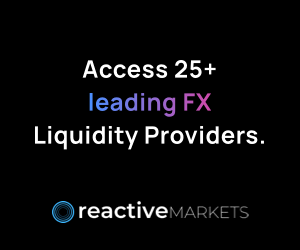Want a Functioning FX Market? Look at the Cost of Pricing
Posted by Colin Lambert. Last updated: April 10, 2024
In our latest Voice of Experience column, regular contributor, Ted Holloway, takes a look back, but only as the basis of a look forward, at the challenges and opportunities facing FX market participants as a whole.
A recent article published by The Full FX discussed and highlighted some of the changes the FX market has experienced over the last 10 years. As an ex-banker, I thought I would share my insights on what, in my opinion, has changed since 2014, what the market is currently experiencing, as well as my thoughts on where FX is heading.
Firstly, if we wind the clock back to circa-2014, the FX market was embroiled in scandal. I don’t propose to spend too much time on this subject as enough has already been written and spoken about it. I do, however, think the market created its own problems. FX, at its core, has always been a price-driven business and as such, distinguishing yourself in this environment was very tough.
One of the routes to achieve such a distinction involved the industry’s polls. To have an independent poll recognise your capabilities in a highly competitive business was viewed as key.
Euromoney was undoubtedly king of the FX polls, and being recognised as Number One, and certainly top five was coveted by most that operated in the markets. Volume, not profit (more on that later) was the name of the game, and I would argue that the endless drive for this, compromised behaviours and resulted in the scandals mentioned earlier.
As result the market had to change. The current emphasis has very much been on what I call the two R’s, Regulation and Reputation. These two elements have very much shaped the FX market we see today. Regulation was necessary given the problems highlighted above. It’s a widely debated subject, as let’s face it no-one likes to have their business regulated, however, as I mentioned before, the market, in my view, brought this upon itself, and I don’t foresee it changing anytime soon.
The interesting change to me has been the second ‘R’, reputation. Reputational Risk has played a huge part in how a number of FX market participants have approached the business. This particular risk is very much self-regulatory and therefore means there is no standard approach.
Some banks for example, have chosen to focus on core markets, and support clients accordingly. I think the events post the SNB bombshell only served to tighten and reinforce this stance. Having large FX-related losses, in an area where you have a limited amount of client activity, is not a conversation you want to be having at your next board meeting. As a result, those choosing to remain as active LP’s have seen their market share grow.
It is interesting that the growth in assets under management (AUM) in the last 10 years has been nothing short of astonishing – for eight straight years AUM was growing circa 20% annually. This has slowed in the last two years, thanks to a combination of Russia’s invasion of Ukraine and the huge political uncertainty facing in the West. Nevertheless this growth has helped feed FX markets.
Perhaps one of the biggest changes in the market has been the emergence of the independents – those looking to capture market share across their platforms, and looking at the latest polls it would seem with some success. I have always, however, viewed the spot and short dated sectors of the FX market the most difficult to operate in. Pricing is almost impossible to differentiate upon, and at what point does it become a race to the bottom? Yes, reliability plays a huge part, knowing that you can realistically trade on the price you see is a major factor, however, the costs associated have to be a challenge. Technology never stands still, nor does the constant drive to capture more market share.
In a way these providers find themselves in a similar position to that of the Banks 10 years ago, where independent recognition is vital in advancing the business. Ultimately though I see significant consolidation in this sector. Those with the deepest pockets will survive – profitability drives all.
As banks have found the costs to participate in the FX market have increased. Quite apart from the additional capital requirements associated with running a FICC business, there are significant regulatory costs, and then as mentioned before there is reputation risk. KYC anyone?
Eventually there has to be a ‘correct’ charge for liquidity – it will be the only way to maintain a functional market
Let’s not go there, but anyone reading this who is either charged with finding new, or adding funds to existing business knows exactly what I mean. Therefore, ensuring that capital is successfully deployed has been the key. A greater focus on clients and harnessing the power of the whole, rather than individual units has seen the best get bigger and better. That’s why it is tough to break out exactly what FX is generating in terms of profits, but as a capital light business it certainly plays its part.
Going forward, and notwithstanding a Black Swan event, what is the future is for the FX market? Regulation will remain but its impact will lessen, as the market becomes used to In other words, it will be BAU. Reputational risk, as I mentioned earlier, has, and will continue to, have a greater impact.
Those that have chosen to focus on core clients and businesses will continue that practice, quite apart from the risk of being caught out in non-core markets, the cost of entry to significantly participate in the high-volume end of the FX market is prohibitive, and unprofitable. Choosing this path also has the benefits of being able to clearly identify client wallet and whether just providing FX facilities to some is economically viable. I think this is probably why the market is seeing the rise of independent players, as certain LP’s have quietly pulled away from offering liquidity in area where they see limited value.
As for the independents themselves, I very much see this as a race to the bottom. Technology is key and remaining relevant comes at a significant cost. At present their market share is building, and the stance that some other firms have taken, is no doubt contributing to that. There is only a finite amount of volume, however, and with spread compression continuing the only way to maintain revenues is to increase market share. This will inevitably lead to contraction and consolidation.
Also don’t forget liquidity has to come from somewhere. The pool of providers is getting smaller. I have mentioned the risks I believe this presents in a previous article, and it will probably take one of those to change the current model again.
Eventually there has to be a ‘correct’ charge for liquidity – it will be the only way to maintain a functional market.




